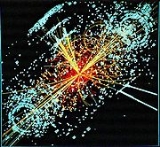edport
Something is fundamentaly wrong with the concept of dark matter and dark energy, and recent discoveries seem to bare this out. A recent study of colliding galaxies, where gravitational lensing was used to determine the structure of the "dark matter" showed that the dark matter was uneffected by the collision, not interacting with the colliding galaxies or their specific "dark matter". If the dark matter doesn't interact with these colliding galaxies, how can hold them together? If the gravitational lensing is accurate, then it's interacting with the photons on light, yet not the mass of the galaxies.If that's true, then the acceleration of the universe may be an illusion, distorting the doppler effect.As for why galaxies act as if they have much more mass than can be seen,could it be possible that a great deal of mass, formed together,like a galaxy, becomes exponentialy greater than a single object?Are we vastly underestimating the amount of black holes in the universe? If the universe is expanding at a growing rate, could the most massive particles have been ejected at a higher speed than the rest of the particles, causing gravity to be such a weak force, and creating a "shell" at the edge of the universe that is pulling everything outward, towards that shell? Could a form of convection be causing the expansion to accelerate, where as the universe grows cooler, it tends to create space at a greater rate. Just food for thought, and I would love to hear sound principles as to why I am wrong. It seems to me that we are missing something very fundamental, and possibly very simple, about the universe and our observations.We know light can be stretched and contracted, the doppler effect. Is there something that is stretching these light waves that make it appear as though the universe's expansion is accelerating? Dark matter doesn't work for me. How can it hold a galaxy together, yet be uneffected by the collisions of galaxies? Thanks to all who read this post.


